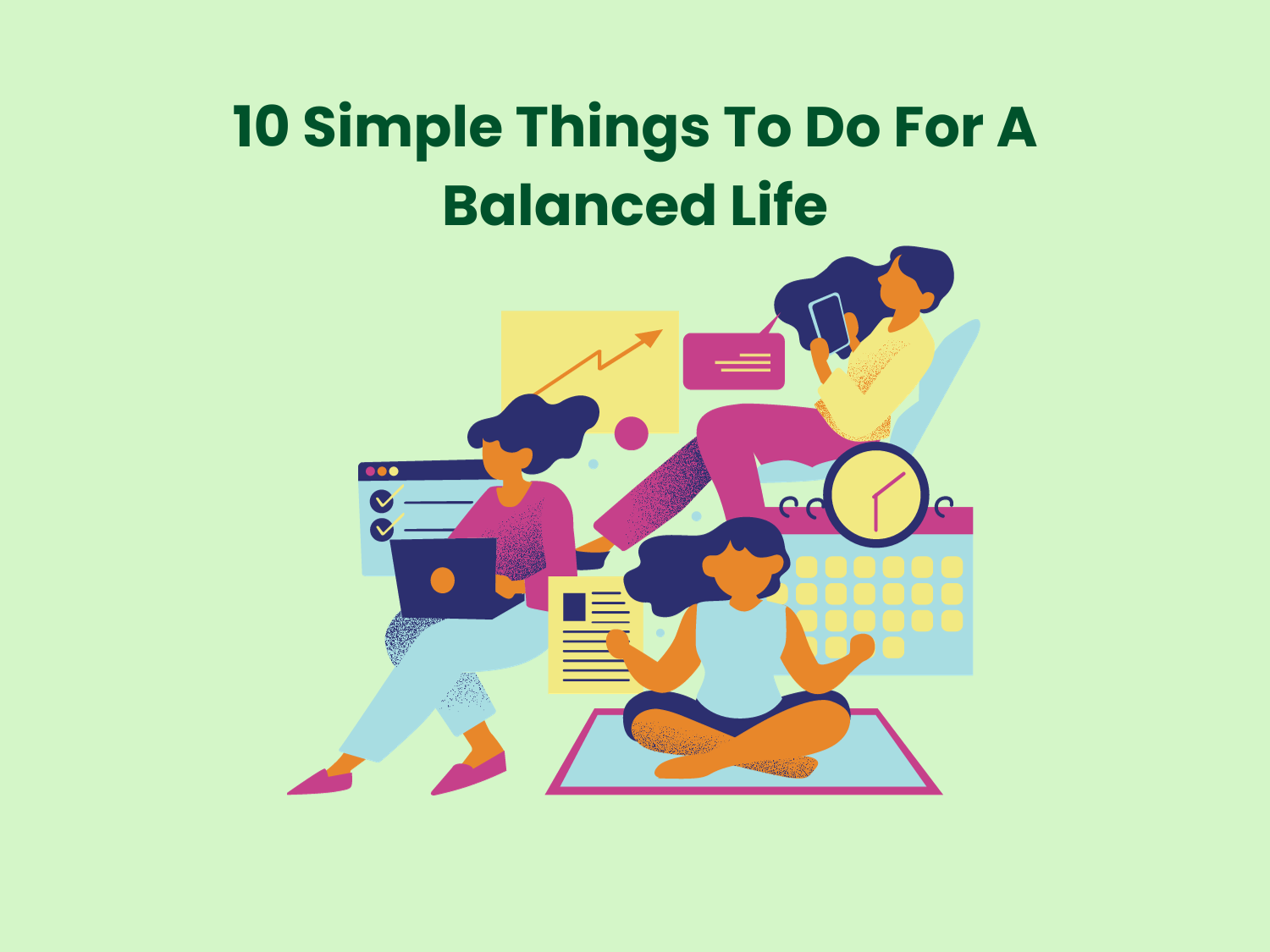Achieving balance in life is essential for overall health, happiness, and well-being. An unbalanced lifestyle filled with obligations and responsibilities with little time for self-care and leisure often leads to stress, burnout, and declining mental health. Making small, consistent changes to introduce more balance not only improves your quality of life but also allows you to be more engaged, productive, and present.
1. Prioritize Self-Care For A Balanced Life
Why is self-care important?
Taking care of your own needs should be the building blocks of a balanced life. Self-care refers to any activity that we deliberately choose to engage in to maintain and improve our mental, emotional, and physical health. When we consistently practice self-care, we are better able to handle daily stressors, strengthen relationships, and feel more confident to pursue goals and dreams. Ignoring self-care often has ripple effects in all other areas of life.
Easy self-care ideas
Self-care does not need to be complicated or time-consuming. Start with small, enjoyable activities that nourish your mind and body:
- Take a 10-minute walk outdoors
- Read an uplifting book
- Enjoy a warm bath
- Listen to your favorite music or podcast
- Spend time with a pet
- Write in a gratitude journal
- Prepare a nourishing meal
- Do gentle stretches or yoga
- Prioritize adequate sleep
Choose activities you find relaxing and rejuvenating, and aim for at least one act of self-care each day.
2. Establish Healthy Boundaries For A Balanced Life
What are personal boundaries?
Boundaries refer to the limits and rules we set for ourselves within relationships, work obligations, and any situation that requires our time and energy. Boundaries allow us to allocate our resources in a reasonable manner so that no area of life is neglected or overwhelmed.
Tips for setting boundaries
Here are some tips for establishing boundaries across different life domains:
- At work, set limits on working hours, decline meetings when needed for focus work, take breaks
- In relationships, have regular alone time for hobbies, friends, and self-care
- With family, set expectations on visit length, financial support
- With friends, limit favors, be honest about availability
- Online, limit time on devices, disable notifications
- Schedule daily reflection to tune into needs, desires, stress signals
Remember – boundaries are for you, not others. Learning to say “no” and setting limits frees up mental space for the people and activities you genuinely want to say “yes” to.
3. Cultivate Meaningful Relationships For A Balanced Life
Why are relationships important?
Humans are wired for connection. Science consistently shows that meaningful relationships strongly correlate with happiness, health, self-esteem, and even longevity. People who feel connected report lower stress, greater resilience, and an overall increased sense of well-being.
Nurturing relationships
Make an effort to nurture the special people in your life:
- Schedule one-on-one catch-up sessions
- Send thoughtful texts, care packages, or small gifts
- Celebrate milestones and achievements
- Make time for phone and video calls
- Plan regular activities together
- Show appreciation for loved ones
- Listen deeply without judgment
- Share joyful moments and difficult times
The time invested in relationships always pays dividends for the overall balance.
4. Manage Stress Effectively For A Balanced Life
How does stress affect balance?
Stress often stems from feeling overloaded, unable to cope with pressures, or uncertain about the future. Over time, chronic stress has harmful effects – it can disrupt sleep, trigger anxiety and depression, impair focus and decision-making, weaken the immune system, and lead to serious health issues. Learning stress management strategies is vital for balance.
Stress management techniques
- Establish a consistent mindfulness practice – meditation, journaling
- Reduce sources of stress where possible – minimize contact with toxic people
- Talk to a trusted friend or therapist
- Practice yoga, go for a walk or exercise
- Listen to music or read poetry
- Spend time in nature and with pets
- Maintain work-life boundaries
- Take relaxing vacations and staycations
- Laugh out loud
- Get adequate sleep
As much as possible, protect your peace of mind to keep stress from accumulating. Your future self will thank you.
5. Pursue Personal Growth For A Balanced Life
Why is personal growth important?
Personal growth expands our understanding of ourselves and the world through continual learning and self-discovery. As we courageously set goals, acquire new skills, engage in self-reflection, and push beyond our comfort zone, we tap into dormant potential and evolve into our best selves. Personal growth not only leads to new capabilities but also boosts confidence to make positive life changes.
Tips for growth
- Read books across diverse topics
- Take a class – art, writing, communication
- Seek out new perspectives
- Improve emotional intelligence
- Set learning goals for the year
- Join a book club
- Find a mentor
- Seek knowledge from experts
- Travel to learn about other cultures
- Write reflections on insights gained
Commit to being a lifelong learner – it will keep you engaged, motivated, and expanding.
6. Time Management Strategies For A Balanced Life
Why manage time?
Today’s fast-paced, information-overloaded world often leaves us feeling scattered, overwhelmed, and unproductive. Without solid time management skills, days seem to slip away without accomplishing what we intended. Over time, this leads to regret, disappointment, and frustration. Time management allows you to use time wisely and align with your priorities and values.
Effective time management tips
- Clarify your core values and goals
- Plan weekly with set routines
- Prioritize important (not just urgent) tasks
- Batch similar tasks to use time efficiently
- Take breaks to recharge
- Identify peak productivity times
- Delegate or outsource tasks when possible
- Overestimate how much time tasks will take
- Say no to non-essential requests
- Reward progress and consistency
With deliberate planning, you can control your schedule rather than letting it control you.
7. Healthy Lifestyle Choices For A Balanced Life
Why have a healthy lifestyle?
Our daily habits and behaviors related to diet, exercise, sleep, and stress management directly impact both physical and mental health. A balanced lifestyle where we feel energized, mentally clear, and physically vital requires mindful nurturing through healthy lifestyle choices.
Components of a healthy lifestyle
- Nutritious whole food diet full of fruits, vegetables, lean protein, healthy fats
- Adequate hydration – drink plenty of water throughout the day
- Regular exercise mixed with rest days – aim for 30 minutes daily
- Sufficient high-quality sleep to wake up refreshed
- Stress relieving activities – BLOCKS meditation, baths, time in nature
- Avoidance of smoking, excessive alcohol, and substance abuse
- Building community and close relationships
- Engaging in work and hobbies that provide meaning
Consistently making choices to nourish your body and spirit will sustain you for the long run.
8. Achieve Financial Wellness For A Balanced Life
How does money relate to balance?
Financial health contributes enormously to overall well-being. When cash flow is constrained and debts loom, it’s challenging to pursue dreams, enjoy peace of mind, and be free to engage in self-care. Alternatively, achieving financial wellness through responsible spending, saving, and investing creates an immense sense of security to weather life’s ups and downs.
Tips for financial wellness
- Track monthly expense categories with budgeting software
- Reduce unnecessary expenses
- Pay off loans and credit card balances
- Build an emergency savings fund
- Open a retirement savings account
- Learn investing basics – compound growth
- Consult fee-only financial planners
- Consider side hustles and passive income streams
- Avoid emotional purchases and impulse buys
Building financial literacy skills takes time but pays off exponentially. Even small, consistent actions to spend wisely and save add up.
9. Embrace Mindfulness For A Balanced Life
What is mindfulness?
Mindfulness means maintaining present moment awareness with openness, curiosity and non-judgement. It involves tuning into sensory experiences, thoughts, and feelings without analysis or criticism. Regular mindfulness practice counteracts typical mind wandering and ruminating over the past and future.
Benefits of mindfulness
- Reduced stress and anxiety
- Increased focus and concentration
- Heightened self-awareness and emotional intelligence
- Improved sleep quality
- Boosted immune function
- Enhanced relationships and communication skills
- Greater life satisfaction and meaning
From simply taking pause to notice your breath to formal meditation, incorporating mindfulness positively impacts both inner and outer worlds.
10. Engage In Enjoyable Hobbies For A Balanced Life
Are hobbies necessary?
Hobbies refer to any leisure activities we partake in purely for enjoyment outside of work and other obligations. Hobbies provide balance by giving our brains a break from problem-solving to immerse in creativity and play instead. The relaxation and stress relief of losing oneself in a hobby also boosts well-being.
Tips for integrating hobbies
- Schedule hobby time in your calendar
- Explore new hobbies – gardening, puzzles, photography
- Alternate high-energy hobbies
Conclusion
The key to finding balance is remembering that every small choice matters. Consistently practicing self-care, setting boundaries, nourishing relationships, managing stress, engaging in personal growth and fun hobbies, making healthy lifestyle choices, achieving financial wellness, and cultivating mindfulness will completely transform how you feel about and experience life.
While changing habits takes concerted effort, focusing on one new area at a time makes it manageable. Enlist friends to join you in a challenge for extra motivation and accountability.
The freedom and joy that comes from an organized yet balanced schedule is immeasurable. As you gently improve every dimension of your existence, you will uncover depths of mental clarity, creativity, and vitality you never knew possible. Life becomes filled with greater ease and flow.
The time is now – what is one positive change regarding balance you can make today?
Frequently Asked Questions
Why is balance important?
Balance is essential for both physical and mental health. An unbalanced, stressful lifestyle often leads to fatigue, anxiety, depression, weight gain, and illness over time due to the toxic effects of chronic stress. We need adequate rest, nutrition, leisure, solitary time, and daily social connection to function optimally.
How do I know my life is unbalanced?
Signs of an unbalanced life include:
- Constant fatigue
- Frequent sickness
- Feeling anxious and worried
- Difficulty concentrating
- Always feeling rushed
- No time for relationships
- No time for fun or self-care
- Turning to unhealthy coping mechanisms
Pay attention to your stress levels and energy reserves. Reflect on all domains of life to identify areas needing attention.
What should I focus on first?
When striving for more balance, pick just one area needing improvement instead of overhauling everything simultaneously. Good places to start are boundaries, scheduling self-care, or cultivating relationships. Once that first area feels more stable, move to the next one. Baby steps work best for creating lasting change without added pressure.
How long does it take to reach balanced life?
There is no perfect end point – living a balanced life is an ongoing practice. The time it takes to restore equilibrium depends on individual circumstances and how willing you are to stick to new routines. Having reasonable expectations, celebrating small wins, and not being too rigid help quicken the transition. Within a few months of daily upkeep, you should feel notable positive impacts.



